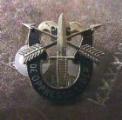Exactly, we tend to forget that there are alternative forms of governancethat don't fit into our preconceived notions of how a polity (as opposed to a state) is meant to function. There are/were innumerable tribal networks of authority and consultation (the pre-Revolutionary loya Jirga was one) that help form, develop and direct consensus. The fact that these processes dont seem to fit the Weberian ideal type of a rational organisation confounds us especially where we seek to "interface" withnthem (i.e., CIMIC). Which brings me to this...
Wasn't the push for a constituion part and parcel of the CIMIC measures we forced/suggested to them? Which brings me to this....
Our colonial perspective isn't just about the "form" of government "we'd" like to see. It's much deeper than you acknowledge. The "state" as a rational, bureaucratic (never could spell that!) actor as we understand it and foist on others is as much part of the problem and is a collonial one to boot. We have a "standard of civlisation" which, when others fail to meet it, we assume it is because their "states" are imperfect (there's a functionalist bias in there somewhere) which we assume social engineering and legal machinery can "fix". You only need to puruse our COIN manuals to see that "state building"- the re-creation of ther states into "our" image- seems to be more important than working through existing structures...and then we wonder why there's "friction": military and otherwise, when our rival systems don't "gell" and when the "natives" revolt!!!. But you can only do that by either destroying the very structure/fabric of "Afghan" life and totally re-educating the "Afghans" or by superimposing "Western" state structures (and that entails) on top of an existing diffuse system of authority/value allocation. Our greatets successes have worked when we have ourselves adopted their system of tribal networks. Our failures (politically) have resulted from ignorance of that. The American system of governance works because it is American; it was an organic development in which all participants to that particular revolt were able to make their voices felt.






 , it's probably just envy speaking!).
, it's probably just envy speaking!).

 .
.



Bookmarks